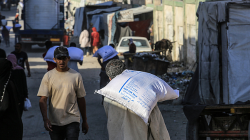UN Reports Gaza Humanitarian Crisis at Its Worst Since War Began
UN describes Gaza's humanitarian crisis as catastrophic, marking the worst since the October 2023 conflict.

The humanitarian crisis in Gaza has reached unprecedented levels, with the United Nations describing the current situation as catastrophic and the worst witnessed since the onset of the war in October 2023. The region continues to reel under persistent airstrikes, rampant malnutrition, mass displacement, and a near-total breakdown in public order, placing over two million residents in peril.
The UN Office for the Coordination of Humanitarian Affairs (OCHA) reported that just five truckloads of aid managed to enter Gaza on Thursday—the first such delivery in four days. Attempts to bring in additional supplies through the Kerem Shalom crossing were thwarted by renewed hostilities and armed gangs operating nearby, forcing dozens of trucks to retreat before reaching those in need. OCHA officials detailed that the few trucks allowed through carried critical medical supplies destined for Deir Al-Balah's field hospital, most of which were subsequently looted amid ongoing chaos.
The difficulty of delivering aid comes at a time when humanitarian needs in Gaza have "exploded," said OCHA, following nearly 80 days of what it characterized as a total blockade. Aid deliveries have plummeted so drastically that the scant supplies now reaching the enclave are wholly inadequate for the estimated 2.1 million residents relying on assistance. Despite extreme challenges and severe restrictions on what can be brought into Gaza, UN agencies and their partners continue efforts to support the population.
The complex security situation is compounded by attacks targeting the remaining operational medical infrastructure. OCHA confirmed that Al Awda, the last partially functioning hospital, was forced to evacuate following repeated strikes in its vicinity. Further violence was reported in central and southern regions, including Deir al-Balah and the camps of Al Bureij and An Nuseirat. In one tragic incident earlier this week, nine members of a journalist’s family lost their lives and 15 more people were injured when their home was struck.
Humanitarian workers themselves face mounting dangers. The international aid organization IHH, which operates community kitchens across Gaza, announced the deaths of five staff members and injuries to two others over a two-day period. OCHA reiterated the necessity of protecting civilians and aid personnel as required by international law.
Displacement within Gaza has surged, with nearly 200,000 people uprooted in the last two weeks alone. New evacuation orders issued by Israeli authorities now cover about 30 percent of Gaza’s territory, encompassing large swathes of North Gaza, eastern Gaza City, and Deir al-Balah. Officials note that some observed movement is driven less by evacuation orders than by the desperate search for food and essentials.
Efforts to address immediate shelter needs are ongoing, with emergency shelter kits distributed to affected families in Gaza City as part of pilot programs. Yet, these actions only scratch the surface of overwhelming demand. Meanwhile, the breakdown in public safety has enabled further looting—including a recent incident where armed individuals stormed a field hospital warehouse, making off with equipment, medicines, and nutritional supplements intended for malnourished children.
OCHA has stressed the importance of restoring order and safeguarding aid supplies, emphasizing that Israel, as the occupying power, holds primary responsibility to reestablish public order and ensure safety. The agency called for the immediate entry of more humanitarian and commercial goods through various crossings, along with the full lifting of the blockade to address the root causes of deprivation fueling Gaza’s suffering.
Beyond Gaza, conditions in the West Bank continue to deteriorate, with a notable rise in violence by Israeli settlers. More than 220 Palestinians have reportedly been injured in recent months, marking the highest rate of such incidents in at least two decades. Entire communities, such as the 120-strong Maghayer ad Deir Bedouin families, have faced forcible displacement following attacks and settlement expansions.
In Salfit governorate, stringent Israeli movement restrictions are disrupting life for nearly 90,000 Palestinians. Recent military operations have led to prolonged closures, forcing civilians to take long detours, increasing transportation costs, and complicating access to health care, education, and livelihoods. OCHA underscored that safe, unimpeded access to basic services remains essential for all civilians, urging action to meet these urgent needs and to avert even greater tragedy.




